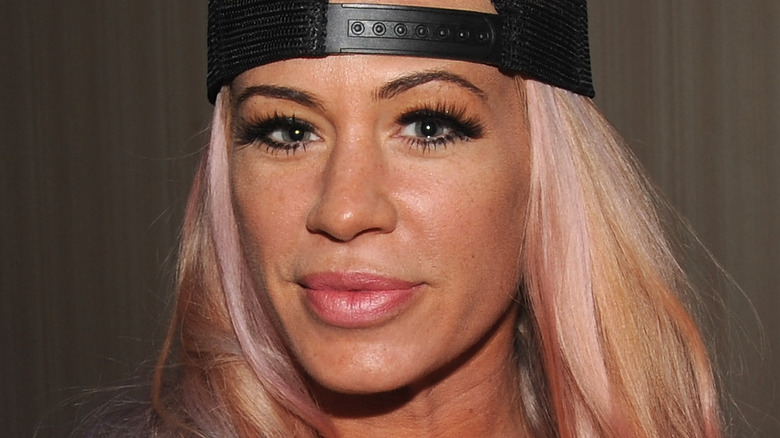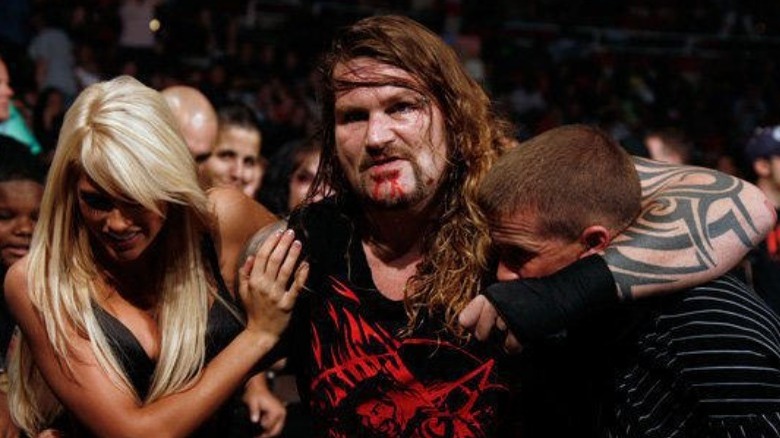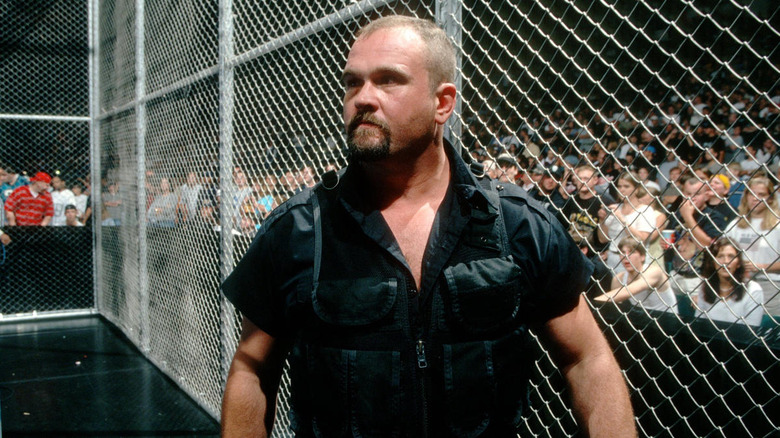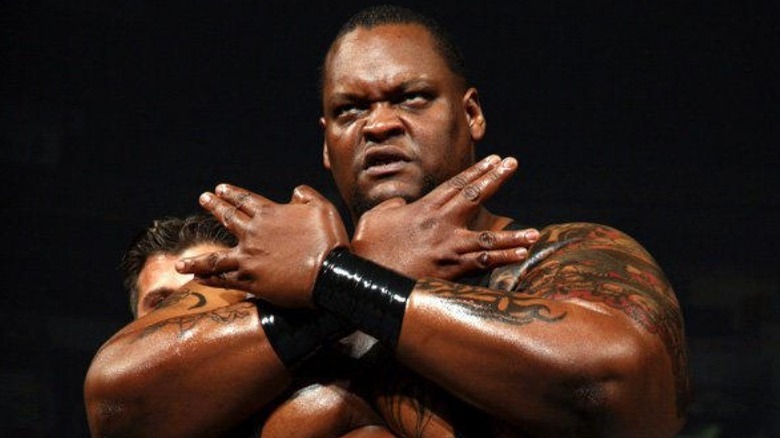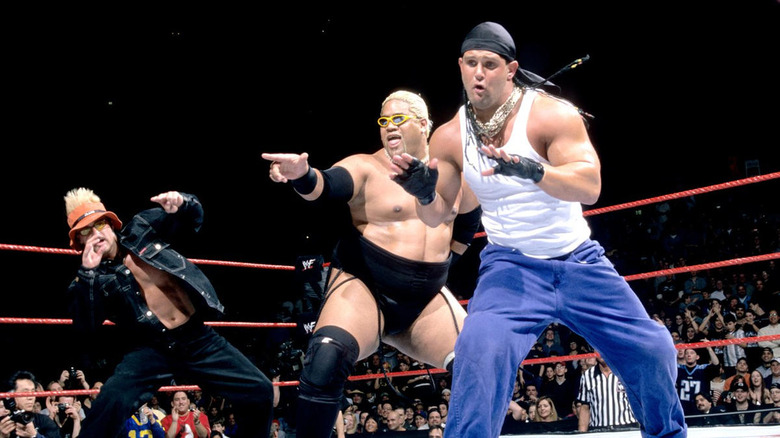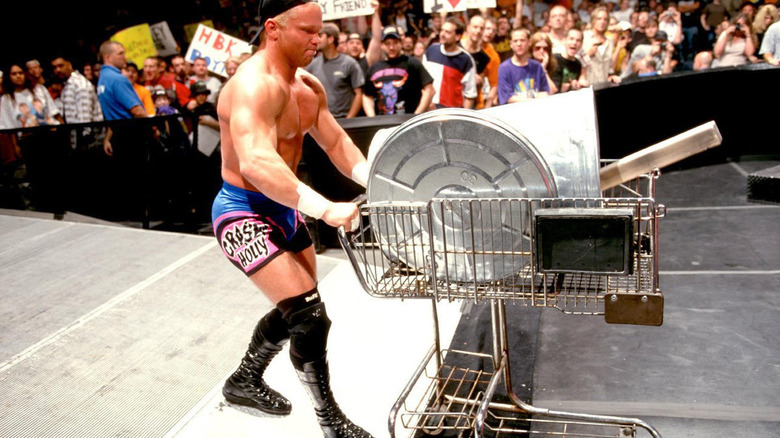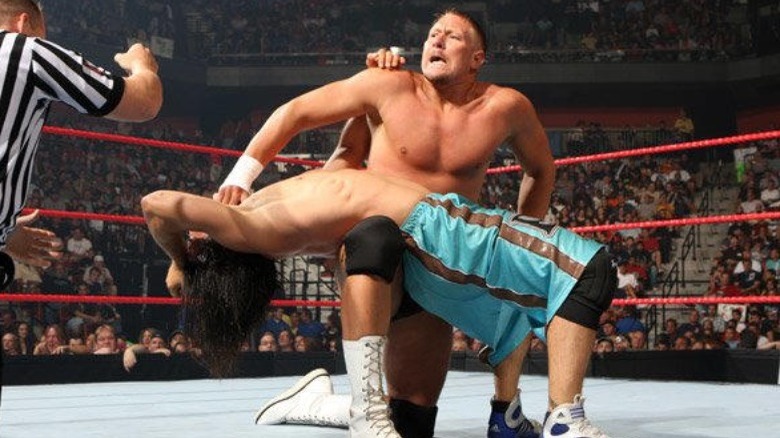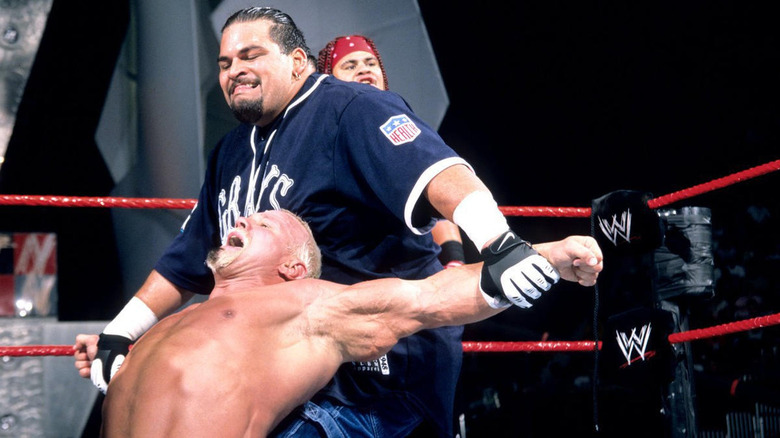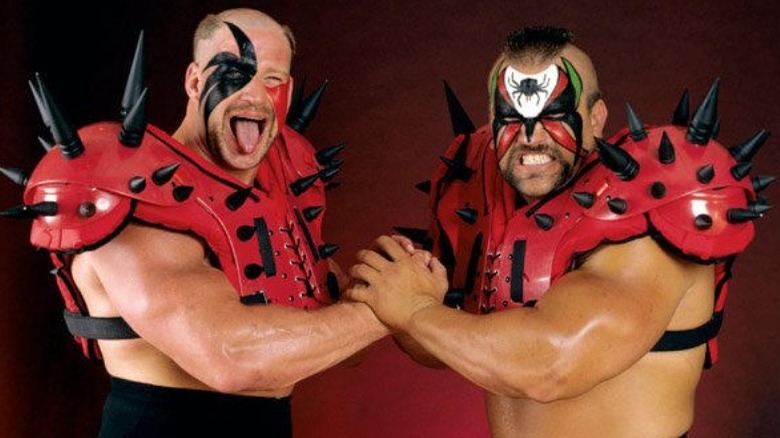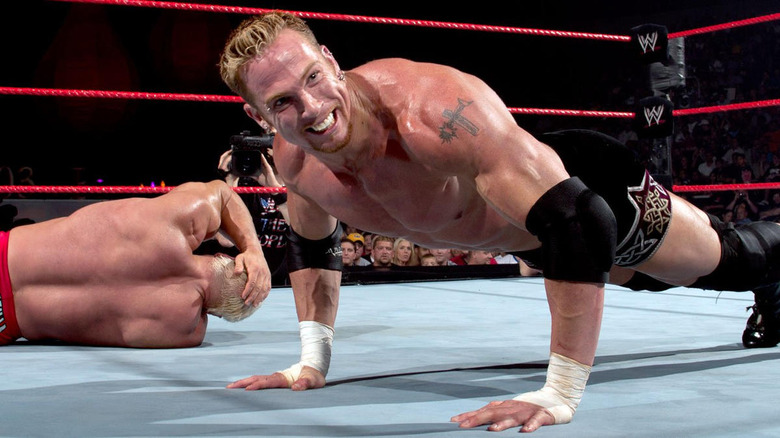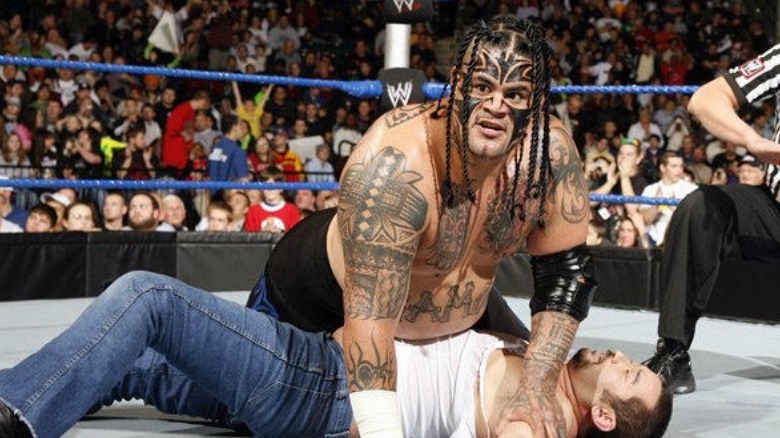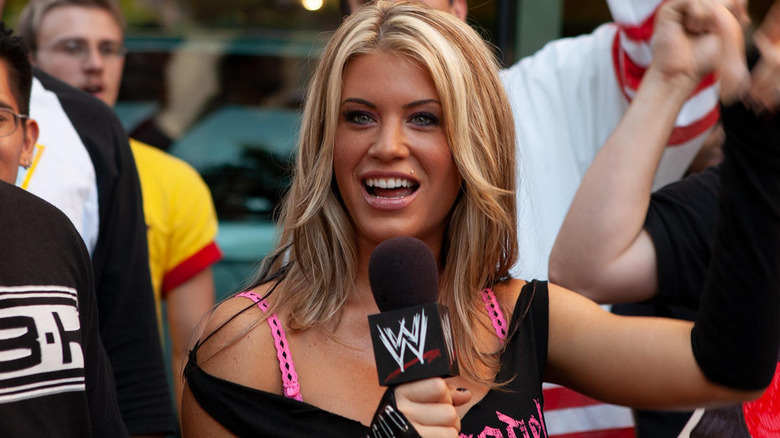WWE Stars You Might Not Know Passed Away
Professional wrestlers go through great lengths and put their bodies on the line to entertain fans across the globe. Unfortunately, the lengths many wrestlers have gone through have come at a cost. The in-ring work wrestlers do is hard on the body, and the cutthroat style of business doesn't do them any favors either. This tough lifestyle has made wrestlers suffer head injuries, chronic pain, and depression, and some have turned to substance abuse for those reasons. Others have turned to steroids to remain fit in a competitive environment, which is notably bad for the heart. These issues have led to the untimely deaths for plenty of pro wrestlers.
Over the years, some wrestlers who have passed away have received plenty of attention from the media and wrestling companies. You may remember reading about the recent deaths of wrestlers like Scott Hall (2022), Brodie Lee/Luke Harper (2020), Chyna (2016), Dusty Rhodes (2015) and "Rowdy" Roddy Piper (2015). But each year, there are several other deaths of wrestlers that go unnoticed by the masses. Some may have only received a slight mention on WWE programming instead of proper commemoration. Here are some wrestlers who have passed away that might have fallen under your radar.
Balls Mahoney
Balls Mahoney, real name Jonathan Rechner, is an ECW legend. He was most known for wielding custom steel chairs for his matches and entering the ring with AC/DC's fan-favorite song "Big Balls." He also formed a tag team in ECW with Axl Rotten, and the team was aptly named "The Hardcore Chair Swingin' Freaks." Needless to say, Rechner embraced the extreme side of wrestling to the fullest extent possible.
Rechner had a few stints in WWF/E as well, including with WWE's revived ECW brand in the mid-2000s. He wasn't given a ton of opportunities to shine with the company, but he did have a notable storyline with Kelly Kelly where the two formed an on-screen relationship.
Unfortunately, like many former wrestlers, Rechner's life was cut way too short. Rechner died of a heart attack at the age of 44 in April of 2016. After his death, it was discovered that Rechner also suffered from chronic traumatic encephalopathy (CTE), a degenerative brain disease which has affected several athletes who play football and combat sports.
Big Boss Man
Ray Traylor Jr. was once a corrections officer in Cobb County, Georgia, and he used that experience to form a memorable gimmick in the ring. He was a fan-beloved babyface and a disgusting heel at different points in his career, making him one of the WWF/E's best characters in the '90s.
Traylor became "Big Boss Man" in 1988 with the WWF, notably using police-themed weapons such as handcuffs and a nightstick. During his first run with the WWF, Traylor feuded with legends like Hulk Hogan, "Macho Man" Randy Savage and Bobby "The Brain" Heenan. He later competed in WCW as "The Boss" in the '90s before rejoining the WWF during the company's famous Attitude Era. He spent time in Vince McMahon's heel stable The Corporation and later partook in a couple of unpleasant feuds when he (kayfabe) cooked Al Snow's dog "Pepper" and (again, thankfully kayfabe) crashed the funeral of The Big Show's father and drove away with the casket.
Traylor eventually fizzled out in WWE, but his legendary status has lived on. He unexpectedly passed away at the age of 41 in September 2004 due to a heart attack. The WWE posthumously inducted Traylor into the WWE Hall of Fame in 2016.
Big Daddy V/Viscera/Mabel
Among all the superstars who have graced the presence of wrestling fans over the years, nobody has had a look quite like Nelson Frazier Jr.
Standing at 6-foot-9 and almost 500 pounds, Frazier was a massive man of several names in WWF/E, going by monikers like "Mabel" and "Viscera" early on in his career. Known for his terrifying "big splash" finisher, Frazier left his mark in the business by winning WWF's 1995 King of the Ring tournament and challenging Diesel for the WWF Championship later that year at SummerSlam. He later rebranded himself as "Big Daddy V" during his second stint with WWE, dubbing himself the "World's Largest Love Machine" and partaking in a racy storyline with ring announcer Lilian Garcia.
In February 2014, Frazier died of a heart attack at the age of 43. After his death, Frazier's wife filed a wrongful death lawsuit against the WWE, which claimed the company withheld important information regarding the danger of repeated blows to the head suffered while wrestling. She said that Frazier showed signs of CTE in the years leading up to his death, including memory loss, migraines and depression.
Ultimately, the case was thrown out, with the judge noting that Frazier's death was not linked to CTE.
Brian Christopher (Grandmaster Sexay)
There weren't many guys cooler than Too Cool during the WWF's Attitude Era. The tag team which consisted of Scotty 2 Hotty, Grandmaster Sexay, and later Rikishi was one of the most over acts in wrestling for a short time thanks to its hip hop dancing gimmick. The team was also a part of one of the most hilarious segments in Royal Rumble history when all three decided to bust a move in the middle of the match.
One-third of Too Cool — Grandmaster Sexay — was actually the son of famous wrestler and commentator Jerry "The King" Lawler. Real name Brian Christopher Lawler, he had a long stint with the United States Wrestling Association before joining WWF. With Too Cool, Brian somehow only won the WWF Tag Team Championships one time, but the team's popularity still lives on.
Unfortunately Brian's post-wrestling career was filled with bad decisions. Brian was arrested a few times in 2009 for issues like disorderly conduct, public intoxication, and failing to appear at rehab as part of a plea agreement. In 2018, he tried to run from a hotel bill and later faced charges for DUI and evading arrest. Following Brian's arrest for the DUI, his life came to a tragic end in July 2018 when he was found hanging in his jail cell and later pronounced dead. Brian was 46 when he passed.
If you or anyone you know is having suicidal thoughts, please call the National Suicide Prevention Lifeline by dialing 988 or by calling 1-800-273-TALK (8255).
Crash Holly
Before WWE's 24/7 Championship, there was the WWF Hardcore Championship, which was defended 24 hours, 7 days a week. Only three wrestlers can boast over 20 reigns of the Hardcore title, and Crash Holly is one of them.
Michael Lockwood started wrestling under the name "Crash Holly" in 1999, debuting as Hardcore Holly's annoying cousin. Lockwood stood at 5-foot-10 and just under 200 pounds, but he wouldn't admit that — he'd notably carry a scale to the ring and claim to be well over 400 pounds. Regardless of weight, Lockwood made a name for himself in WWF as a hardcore Houdini, winning the Hardcore Championship 22 times by often sneaking up on others and rolling them up for a pin. He even once defended his title at Fun Time USA. In addition to winning the Hardcore title, Lockwood had one reign each with the WWF Light Heavyweight and European Championships.
In November 2003, Lockwood was found dead in the home of wrestler Stevie Richards at the age of 32. His death was ruled a suicide.
If you or anyone you know is having suicidal thoughts, please call the National Suicide Prevention Lifeline by dialing 988 or by calling 1-800-273-TALK (8255).
Lance Cade
At 6-foot-5 and 260 pounds, Lance Cade had the size and the look. Unfortunately, the WWE just couldn't quite figure out what to do with him.
Real name Lance McNaught, he first teamed up with Mark Jindrak in 2003, and later formed a team with Trevor Murdoch where they portrayed redneck characters. McNaught and Murdoch had three reigns with the World Tag Team Championships, but they were never quite over with the crowd. Eventually, McNaught went back to being a singles wrestler but couldn't quite catch on with a character that worked. The WWE released him in 2008 after an incident on a plane where McNaught allegedly took too many pain pills and had a seizure.
After WWE, McNaught tried to regain momentum as a wrestler in other companies, but his time was cut short. He died of apparent heart failure at age 29 in August 2010, and a later autopsy revealed that his death was caused by a combination of a weakened heart and accidental mixed drug intoxication.
Matt Anoa'i (Rosey)
The Anoaʻi family has produced some of the most popular wrestlers in history. Part of that family is Matt Anoa'i, brother of current WWE superstar Roman Reigns and best known in WWE as "Rosey." Matt made his debut for WWE in 2002 alongside his real-life cousin Eddie Fatu (brother of Rikishi) who was known at the time as "Jamal." The duo debuted as "3-Minute Warning," a heel tag team with a billed weight of over 900 pounds that dominated their opponents with their size and strength. The two somehow never won the tag titles together, but they did have one of the coolest entrance themes at the time.
After Fatu was released, Anoa'i joined The Hurricane and transitioned into a superhero gimmick. Matt was hilariously The Hurricane's "Superhero in Training," or, the "S.H.I.T." The gimmick may have been on the silly side, but the two won the crowd over and eventually captured the WWE World Tag Team Championships. The Hurricane eventually turned heel, leaving Anoa'i on his own and leading to his eventual release.
In April 2017, Anoa'i passed away at the age of 47 due to issues with congestive heart failure and atrial fibrillation.
Road Warriors Animal and Hawk
Are The Road Warriors the greatest tag team of all time? To many, there's no better team.
Also known as the Legion of Doom, the careers of these two spanned multiple decades, and they wrestled and won tag team championships in Japan, WCW, WWF/E and various indie promotions. Known for their face paint, spiked shoulder pads, and over-the-top attitudes, The Road Warriors dominated their in-ring opponents while maintaining one of the most badass personas. Some have attempted to replicate that success, but there's only one Legion of Doom. These two, along with manager Paul Ellering, were inducted into the WWE Hall of Fame in 2011.
Unfortunately, these two legends are examples of '80s wrestlers who were taken way too soon. Road Warrior Hawk (Michael Hegstrand) passed away in October 2003 at age 46, while Road Warrior Animal (Joe Laurinaitis) died in September 2020 at age 60. Both died of heart attacks.
During the time between Hegstrand and Laurinaitis' deaths, Laurinaitis had a late-career surge in WWE when he reformed the Legion of Doom with Heidenreich and won the Tag Team Championships.
Sean O'Haire
Sean O'Haire (real name Sean Haire) is one of the WWE's biggest missed opportunities of the 2000s.
He saw success in WCW as a three-time World Tag Team champion with Mark Jindrak and Chuck Palumbo, but that success didn't end up translating to the WWF/E after the company acquired WCW. Haire and Palumbo came over to the WWF as tag champs but quickly lost their titles to Kane and The Undertaker. A couple years later Haire was repackaged with a new gimmick, where he tempted viewers and fellow wrestlers to commit sins. It was a unique and intriguing gimmick, and he even notched notable wins over wrestlers like Eddie Guerrero and Chris Benoit. Instead of giving Haire a push, though, the WWE decided to abandon the gimmick for unknown reasons. Haire was eventually released shortly after suffering a motorcycle accident in 2003.
In September 2014, Haire took his own life at age 43. It turns out that Haire had battled depression and substance abuse, and had gone to WWE-sponsored rehab several times throughout his career.
If you or anyone you know is having suicidal thoughts, please call the National Suicide Prevention Lifeline by dialing 988 or by calling 1-800-273-TALK (8255).
Test
Andrew Martin, known as Test in WWF/E, may not have reached his full in-ring potential, but he had a solid run and was a key part of some memorable storylines.
Martin's story in the WWF/E is sort of a "what if." He was a focal point of a popular late-'90s storyline where he was supposed to marry Stephanie McMahon, but Triple H interrupted those plans when he revealed that he had (kayfabe) drugged McMahon and married her himself. Martin also played a big part in the Invasion storyline in 2001 when he won an "immunity" battle royal which kept him from being fired.
It always seemed like Martin was due for a big push but never quite received one. He did have some accomplishments, though — he held the Intercontinental, European, Hardcore and Tag Team Championships during his time with the WWF. He was eventually suspended by the company for violating the company's wellness policy and was later released. It's not quite known whether Martin was released for violating the wellness policy or for other reasons, but Martin himself implied the parting was mutual.
Martin tried to continue wrestling after WWE, but we'll never know whether he would have revitalized his career because his life was tragically cut short. Martin was found dead in March 2009 at age 33 after an accidental overdose involving oxycodone. And like many wrestlers who have passed, it was discovered that Martin also had severe CTE.
Umaga
The aforementioned Eddie Fatu may have debuted in WWE as Jamal with his cousin Matt Anoaʻi, but Fatu's most notable run was as Umaga.
Fatu was repackaged and reemerged as Umaga in 2006, attacking Ric Flair in his re-debut. He went on an undefeated streak that lasted for almost a year, earning big wins over John Cena, Triple H and Shawn Michaels. He later challenged for the WWE Championship at New Year's Revolution, but couldn't best Cena, which ended his undefeated streak and maybe his overall momentum. Fatu sadly was never able to capture the top title in his career, but he did manage to win the Intercontinental Championship twice.
Eventually, Fatu was let go by the WWE in 2008 due to violating the company's wellness policy and refusing to go to rehab. It later turns out that Fatu may have had trouble with substance abuse; in December 2009, Fatu was found dead in his home at the age of 36 after suffering a heart attack. At the time of death, Fatu had hydrocodone, carisoprodol and diazepam in his system, and he also suffered from heart disease.
If you or anyone you know is struggling with addiction issues, help is available. Visit the Substance Abuse and Mental Health Services Administration website or contact SAMHSA's National Helpline at 1-800-662-HELP (4357).
Ashley Massaro
Ashley Massaro had a short run in WWE but was a standout thanks to her against-the-grain punk gimmick.
While fans generally have pleasant memories of Massaro, her experience with the company was anything but pleasant. Massaro took part in a class action lawsuit against WWE in 2016, claiming the company was responsible for her head injuries due to a lack of proper training and diagnosis. That's not nearly the worst of it, though: Massaro also detailed an occurrence where she was drugged and sexually abused by a soldier while in Kuwait for a "WWE Tribute to the Troops" event. Massaro claimed that former WWE chairman and CEO Vince McMahon encouraged her to keep the abuse under wraps to maintain the company's relationship with the U.S. military. The lawsuit was ultimately dismissed.
In May 2019, Massaro was found dead in her home at age 39 in an apparent suicide. After her death, a group of female wrestlers launched a GoFundMe to go toward the education of Massaro's daughter, Alexa.
Massaro made the most of her short time as a wrestler. She won the WWE Diva Search in 2005 and was thrust into the gig despite having no wrestling training. She ended up learning on the fly and partaking in feuds with stars like Mickie James, Torrie Wilson, Candace Michelle, and Melina. Massaro eventually appeared on the cover of Playboy which played into several storylines during her WWE career.
If you or anyone you know is having suicidal thoughts, please call the National Suicide Prevention Lifeline by dialing 988 or by calling 1-800-273-TALK (8255).
